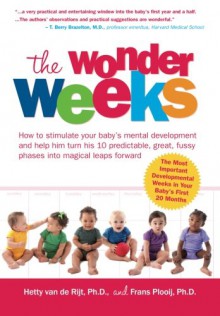The Wonder Weeks: How to Stimulate Your Baby's Mental Development and Help Him Turn His 10 Predictable, Great, Fussy Phases Into Magical Leaps Forward
"The Wonder Weeks. How to stimulate your baby's mental development and help him turn his 10 predictable, great, fussy phases into magical leaps forward" describes in easy-to-understand terms the incredible developmental changes and regression periods that all babies go through during the first 20...
show more
"The Wonder Weeks. How to stimulate your baby's mental development and help him turn his 10 predictable, great, fussy phases into magical leaps forward" describes in easy-to-understand terms the incredible developmental changes and regression periods that all babies go through during the first 20 months of their lives. The extended, white cover edition describes 2 more leaps in the mental development of your baby up to the end of the sensorimotor period. The book offers guidance how to ...: • Know when and why your baby is fussy • Help him/her (and yourself!) get through / survive the fussy phases • Get the most out of these developmental phases The book is based on the scientific- and parental-world-changing discovery of a phenomenon: all normal, healthy babies appear to be more fussy at very nearly the same ages, regression periods, and sleep less in these phases. A worldwide bestseller and sanity savior for parents around the globe. These age-related fluctuations in need for body contact and attention (regression periods) are related to major and quite dramatic changes in the brains of the children. These changes enable a baby to enter a whole new perceptual world and, as a consequence, to learn many new skills. This should be a reason for celebration, but as far as the baby is concerned these changes are bewildering. He's taken aback -- everything has changed overnight. It is as if he has woken up on a strange planet. The book includes: • Week-by-week guide to baby's behavior • When to expect the fussy behavior, what this implies (cranky, clingy, crying (the three C's) behavior) and how to deal with these regression periods (leaps) • A description from your baby's perspective of the world around him and how you can understand the changes he's going through • Fun games and gentle activities you can do with your child For more detailed information about contents and the research behind the book, please visit www.thewonderweeks.com Expert reviews: ---“This is a very practical and entertaining window into the baby’s first year and a half. van de Rijt and Plooij have observed and found the vulnerable times in an infant’s development that I independently came to in my book Touchpoints (Perseus). The authors’ observations and practical suggestions are wonderful.” (T. Berry Brazelton, M.D., professor emeritus, Harvard Medical School). ---“Anyone who deals with infants and young children will want to read 'The Wonder Weeks.' This book will open parents’ eyes to aspects of their children’s growth, development, changing behavior, and emotional responsiveness that they might otherwise not notice or find puzzling and distressing.” (Catherine Snow, Ph.D., Shattuck Professor of Education, Harvard Graduate School of Education). ---“van de Rijt and Plooij’s work on infant development has enormous value for clinical use and scientific application. Not only have they explained the periods of puzzling, difficult behavior in infancy which so worry parents, they have also shown how these behaviors mark developmental leaps and have described the stages in the infant’s understanding. Together, this gives parents and professionals soundly based insight into babies’ developing minds. What’s more, van de Rijt and Plooij have described the play and communication that work best with babies at different ages and thus helped parents understand and connect sensitively with their babies. This parent-child connection is the major prerequisite for the development of secure, well-adjusted children. 'The Wonder Weeks' is essential reading for everyone who works with infants: pediatricians, social workers, psychologists, and, of course, parents.” (John Richer, Ph.D., Dip. Clin. Psychol., consultant clinical psychologist and Head of Pediatric Psychology, Department of Pediatrics, John Radcliffe Hospital, Oxford, England).
show less

